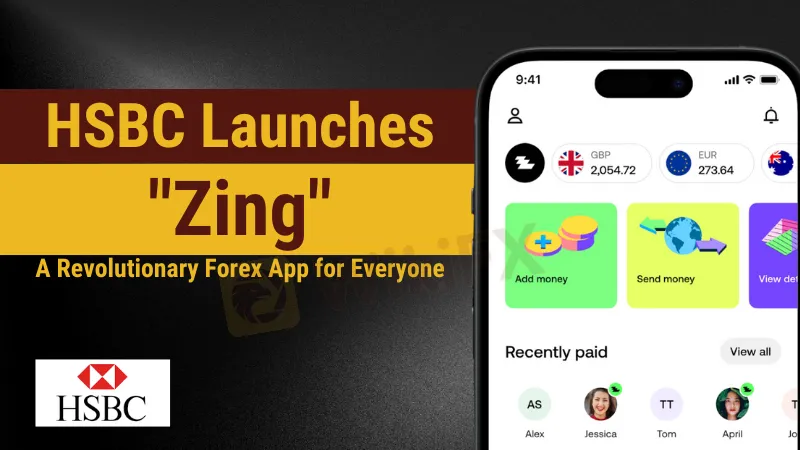简体中文
繁體中文
English
Pусский
日本語
ภาษาไทย
Tiếng Việt
Bahasa Indonesia
Español
हिन्दी
Filippiiniläinen
Français
Deutsch
Português
Türkçe
한국어
العربية
HSBC Launches "Zing" - A Revolutionary Forex App for Everyone
Abstract:HSBC Holdings Plc announces the launch of its latest innovation, "Zing" – an international payments app designed to transform the global forex landscape.

In a groundbreaking move, HSBC Holdings Plc announces the launch of its latest innovation, “Zing” – an international payments app designed to transform the global forex landscape. With this strategic launch, HSBC directly challenges the likes of fintech giants Revolut and Wise Plc, who have significantly impacted the retail customer market through their cost-effective foreign exchange offerings.
Introducing Zing: Your Gateway to Effortless Forex

Zing debuts in the UK, marking the beginning of HSBC's ambitious journey to redefine forex services. The app, accessible on both Apple Inc.‘s Appstore and Alphabet Inc.’s Google Play, is set to be a game-changer in the financial world. The most striking feature of Zing? It's open to everyone, not just HSBC customers, a clear indication of HSBC's inclusive approach towards global financial services.
Three Minutes to a World of Forex Opportunities

Ease of access is at the heart of Zing. According to Nuno Matos, the CEO of HSBCs global wealth and personal banking business, new users can embark on their international payment journey in a mere three minutes. “Zing has a global ambition,” Matos emphasizes, underscoring HSBC's vision to position itself as a leading global platform for international payments.
HSBC's Strategic Move in a Fintech-Dominated Arena
This launch is a significant step for HSBC in a market predominantly influenced by fintech startups. These startups have made considerable strides over the past decade, introducing innovative mobile-based services, from cross-border payments to savings accounts and investment products. HSBCs move with Zing signals a new era of competition in the financial services sector.
Wise and Revolut: Feeling the Market Impact
The announcement has already created ripples in the market, with Wise Plc shares experiencing a notable decline. Despite their successful track record and substantial user base, companies like Wise and Revolut now face a formidable challenger in HSBC's Zing.
Global Money to Zing: HSBC's Continued Forex Evolution

HSBC is no stranger to the forex market. Its existing service, Global Money, has already made significant inroads since 2020, serving existing customers with a fee-free currency service. With transactions totaling approximately $11 billion in 2022, Global Money set the stage for Zing's introduction.
Zing: More Than Just an App
Matos envisions Zing as more than just a forex tool. It's a gateway for users to explore the broader spectrum of banking services offered by HSBC. This aligns with HSBC's strategy to cater to the needs of internationally mobile customers, aiming to establish itself as the go-to financial institution in this sector.
HSBC's Bold Venture into Uncharted Territories
“Zing represents HSBC's bold venture beyond its traditional customer base,” Matos states. With Zing, HSBC is poised to tap into a growing market segment that aligns closely with its global customer profile.
In conclusion, Zing by HSBC is not just an app – it's a testament to the bank's commitment to innovation, inclusivity, and customer-centricity in the ever-evolving world of financial services. As Zing rolls out, it's set to redefine the norms of international payments, making forex transactions effortless and accessible to all.

Disclaimer:
The views in this article only represent the author's personal views, and do not constitute investment advice on this platform. This platform does not guarantee the accuracy, completeness and timeliness of the information in the article, and will not be liable for any loss caused by the use of or reliance on the information in the article.
Read more

OctaFX Flagged by Malaysian Authorities
OctaFX has been officially listed on warning lists by both Bank Negara Malaysia (BNM) and the Securities Commission Malaysia (SC). These alerts raise serious concerns about the broker’s status and whether it is legally allowed to operate in Malaysia.

TradingPRO: A Closer Look at Its Licences
In an industry where safety and transparency are essential, the regulatory status of online brokers has never been more important. For traders seeking to protect their capital, ensuring that a platform operates under recognised and stringent oversight can make all the difference. Keep reading to learn more about TradingPRO and its licenses.

Oil Price Breakout Incoming? Investors Should Stay Alert
Oil prices are hovering around a critical level, with potential yet to be fully unleashed. Investors must prepare for sudden changes.

New SEBI Regulations on Intraday Trading
The Securities and Exchange Board of India (SEBI) has implemented revised regulations on Intraday trading, with effect from November 20, 2024. These regulations are meant to lessen risks and prevent speculative trading practices.
WikiFX Broker
Latest News
How much money will you earn by investing in Vantage Broker?
IronFX vs Exness Review 2025: Comprehensive Broker Comparison
Fraudsters Are Targeting Interactive Brokers' Users with Lookalike Emails
Interactive Brokers: Global Office Visits and Licensing Details
Top Tips to Choose the Best Forex Broker in 2025
SEBI Notifies New F&O Rules for Investors - New Derivative Trading Limits & More Amendments
U.S. Jobs Data Released: A Potential Boost for Gold Prices
SkyLine Guide 2025 Malaysia: 100 Esteemed Judges Successfully Assembled
Everything you need to know about ADSS
Vantage Markets Review 2025: Trusted Forex and CFD Trading Since 2009
Currency Calculator


